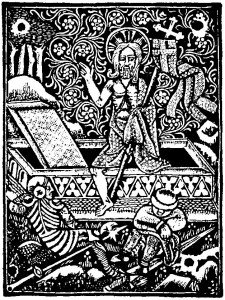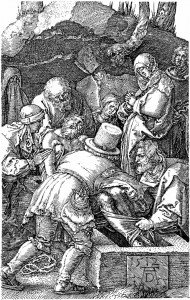 Some churches celebrate the Easter Vigil on Holy Saturday in the evening. Some do it on Easter Day in the morning. Which is right? Well, if you think that the origins of the Easter Vigil lie in the practise of the early church then there’s some justification for either, or perhaps better, both.
Some churches celebrate the Easter Vigil on Holy Saturday in the evening. Some do it on Easter Day in the morning. Which is right? Well, if you think that the origins of the Easter Vigil lie in the practise of the early church then there’s some justification for either, or perhaps better, both.
The idea is that the early church used Lent to prepare people for entry into the church at Easter and the preparations for this would include an all night Vigil from Holy Saturday through until dawn on Easter Day. Liturgists will tell us that it has been the universal practise of the church to celebrate the resurrection with the lighting of a Easter fire, the renewal of baptismal vows for all the faithful and the first mass of Easter.
Liturgists, however, would be wrong. The Easter Vigil only really entered into the life of any normal congregations in modern times when these elements were added to the liturgy of the Roman Catholic Church in 1951. (Don’t believe me? Then show me the Easter Vigil in the Scottish Prayer Book 1929. You’ll look long and hard to find it). Much of the modern keeping of the Triduum and particularly the Vigil comes from the liturgical reforms of the late 1950s and 1960s. That doesn’t invalidate it but it does mean that we must not be too precious about keeping it in the way that it was ever so. It ever wasn’t.
If you begin on the Saturday evening the you begin when the day is done, according to Jewish timing. That means leaving it until after sundown or even better, until you can see three stars in the sky.
We do it on Sunday morning early. Well, relatively early. We start at 7 am. Some will start at dawn and I envy them their “vigilance”.
What I think I’d really like is an all nighter. Vigil of readings and baptisms late at night, sleepover in church and Easter Fire and Eucharist at dawn. I’ve never managed that, but that’s where I’d like to go with it.
The fire is the big excitement. We kindle it in the place of death. Here in St Mary’s that means the patch of ground formerly used as a memorial garden, where ashes were interred. From that fire, the large Paschal candle is lit and blessed by the Bishop. It will burn in church through the Easter season until the gospel of the Ascension on Ascension Day. At that point it is doused as we remember that Jesus is gone from this earth and remember instead that God is with us at all times and forever. The candle will then be lit every time there is a baptism or a funeral. The burning flame connects both events with the early light of Easter Day and the first hearing of the news that Christ is risen.
The service early on Easter Day begins in darkness. No electric light until the fire is lit and light is carried into the church and the Exsultet is sung. This year, Akma’s singing that glorious hymn of praise. As he does so, he’ll sing the light back into existence. Dawn, even if its merely electrically induced, will come in song.
After the service there’s breakfast. Churches which are pure and righteous will guard the sacred, holy fire and keep it unsullied. Churches however which remember the biblical stories will remember that Jesus cooked breakfast on early Easter mornings on a brazier. Do this in remembrance of me he said, often enough.
We’ll do our best.

Recent Comments